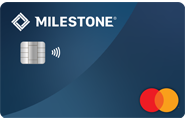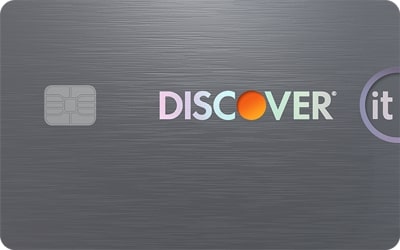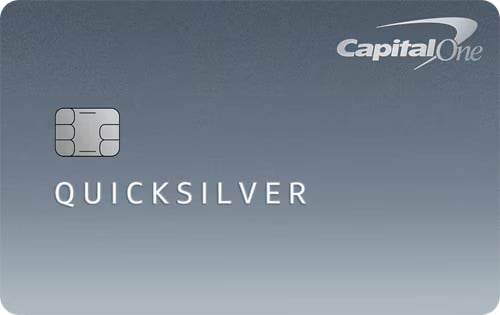Milestone Credit Card: Little to Celebrate With These Fees
The Bottom Line
1.7
You'll avoid a security deposit, but this card has all kinds of other ways to make you pay dearly for credit access. You can do much better with any number of other cards for poor credit.

Rates, fees and offers
Rates, fees and offers
Annual fee
See Terms
Rewards rate
N/A
Bonus offer
N/A
Ongoing APR
APR: See Terms
Foreign transaction fee
1% of each transaction in U.S. dollars.
More details from The Bank of Missouri
More details from The Bank of Missouri
- Greater access to credit than before - $700 credit limit
- Get a Mastercard accepted online, in store and in app
- Account history is reported to the three major credit bureaus in the U.S.
- $0 liability* for unauthorized use
- Access your account online or from your mobile device 24/7
- *Fraud protection provided by Mastercard Zero Liability Protection. If approved, you'll receive the Mastercard Guide to Benefits that details the complete terms with your card.
Pros and Cons
Pros
No security deposit
Reports to all 3 credit bureaus
Qualify with bad credit
Cons
Annual fee
Monthly fee
High APR
Small credit limit
Detailed Review
Contrary to its name, the Milestone® Mastercard® — issued by The Bank of Missouri — isn't exactly worthy of note.
While it's gettable without a security deposit and can help you build credit, it'll cost you dearly in terms of annual and monthly fees. There are far less expensive options, even among credit cards for bad credit (typically, credit scores of 629 or lower).
If you already have the Milestone® Mastercard®, take heart. It isn’t made of Styrofoam, so it doesn't have to last forever. You can cancel the card — a process we explain in greater detail below — and replace it with another product that has friendlier terms.
» SEE: Best credit cards with no credit check
The Milestone® Mastercard® is one of several cards — including the Destiny Mastercard® and Indigo card — serviced by Concora Credit and marketed toward those with poor credit. These cards all tend to charge hefty fees. Check out our guide to all of the Concora Credit cards here.
Milestone® Mastercard®: Basics
Card type: Bad credit or fair credit.
Annual fee: According to the card’s website, the annual fee is determined based on an analysis of your credit profile. As of December 2023, per the website, the annual fee could be as high as $175 in the first year; then $49.
Monthly fee: Up to $12.50 each month ($0 the first year).
Sign-up bonus: N/A.
Rewards: None.
APR: As of December 2023, the APR could be as high as 35.9%, according to the website.
Foreign transaction fee: 1%.
Compare to Other Cards

Benefits and Perks
No security deposit requirement
Some cards for people with bad or no credit require a security deposit to open an account. Those deposits are refundable, but they can be hundreds of dollars, a potentially serious roadblock to credit for many people. The Milestone card is an unsecured product, so no security deposit is required.
Credit bureau reporting
The Milestone® Mastercard® reports to all three major credit bureaus: Equifax, TransUnion and Experian. Thus, responsible credit use such as on-time payments will be captured on your credit report, which can help build your credit.
The annual fee is refundable if you close the account
The pangs of buyer’s remorse that may set in after getting the Milestone® Mastercard® can be cured in a few ways. In the best-case scenario, you’ll cancel the credit card before you’ve used it for purchases or cash advances; that way, Milestone will refund the annual fee. Canceling a credit card can damage your credit scores in more than one way, but there are scenarios where it may be worth it, and the Milestone® Mastercard® ticks many of those boxes: hefty fees, very few perks, and no upgrade path to a better card when you and your credit scores are ready.
If you’ve already used the card, you can still cancel it, but you'll have to pay off the balance first. And note that canceling a card doesn't undo the temporary hit to your credit scores as a result of the hard inquiry that was required to apply for the card.
If you want to cancel the card, you’ll need to notify the issuer. Simply removing the card from your wallet and not using it anymore isn't enough, as you’ll still be charged the annual fee.
Drawbacks and Considerations
Fees that add up
The Milestone® Mastercard® charges several fees, including:
An annual fee.
A monthly fee.
An overlimit fee.
You’ll pay up to a $175 annual fee in the first year to get this card. In subsequent years under those terms, the annual fee decreases to $49 — but because an additional monthly fee of up to $12.50 may kick in after Year One, you could still find yourself paying nearly $200 a year in fees. You might expect that kind of cost with a luxury travel credit card packed with rewards, perks and credits — but the Milestone® Mastercard® offers nothing of the sort to help offset its fees. You could do better with any number of cards for those with less-than-ideal credit, including many secured credit cards. Yes, you'll have to put up a deposit, but unlike with annual and monthly fees, deposits are refundable.
Additionally, if you spend more than the credit limit on your Milestone® Mastercard®, you may incur an overlimit fee of up to $41, which is notable because overlimit fees have been essentially extinct for many years. The card's terms note that you can't be charged this fee unless you opt in to "overlimit coverage," but other issuers will sometimes allow you the courtesy of spending above your limit without requiring a fee for it.
Outrageous interest rate
High APRs are not uncommon among credit cards for poor credit, but it's still worth noting that as of December 2023, the purchase APR on the Milestone® Mastercard® was a truly dizzying 35.9% — far, far higher than average.
That makes carrying a balance on this card extremely costly. If you have the Milestone® Mastercard®, try to pay it off in full every month to prevent your debt from swelling.
Small credit limit
The maximum credit limit on the Milestone® Mastercard® is $700. For some cardholders, $700 would barely cover one month’s rent. And the problem doesn't stop there.
The Milestone card’s annual fee is charged upon account opening, immediately eating into the credit limit. So even if you're approved for a $700 limit, a $175 annual fee would effectively decrease that credit limit to $525 (until you pay the annual fee). This also means that your credit utilization ratio — the amount of available credit you're using, and a major factor in your credit scores — is at 25% right off the bat. Experts recommend keeping that percentage at 30% or lower.
Higher credit limits are possible with other products, especially if you're able to come up with the deposit necessary for a secured credit card. (The deposit, which again is refundable, sets your credit limit.) For example, the Capital One Quicksilver Secured Cash Rewards Credit Card offers credit limits as high as $3,000.
How To Decide If It's Right For You
For the vast majority of people, the Milestone® Mastercard® is a terrible credit card option. It offers shockingly few perks considering that it charges both an annual and a monthly fee, and there's no upgrade path with the issuer to escape those fees.
Even if your finances are in dire straits and your credit score is bad, you can get a credit card that doesn’t cost a cent. Our list of alternative credit cards contains several superior options instead of the Milestone® Mastercard®.
Security deposits start as low as $49
Some applicants may qualify for a $200 credit limit, depending on creditworthiness, by putting down a $49 security deposit. For even more flexibility, Capital One allows cardholders to pay the security deposit in $20 increments with the full amount due within 35 days of account opening. There's no annual fee or foreign transaction fee, either.
Looking For Something Else?
Methodology
NerdWallet reviews credit cards with an eye toward both the quantitative and qualitative features of a card. Quantitative features are those that boil down to dollars and cents, such as fees, interest rates, rewards (including earning rates and redemption values) and the cash value of benefits and perks. Qualitative factors are those that affect how easy or difficult it is for a typical cardholder to get good value from the card. They include such things as the ease of application, simplicity of the rewards structure, the likelihood of using certain features, and whether a card is well-suited to everyday use or is best reserved for specific purchases. Our star ratings serve as a general gauge of how each card compares with others in its class, but star ratings are intended to be just one consideration when a consumer is choosing a credit card. Learn how NerdWallet rates credit cards.
About the author

Jae Bratton
Lead Writer & Content Strategist



